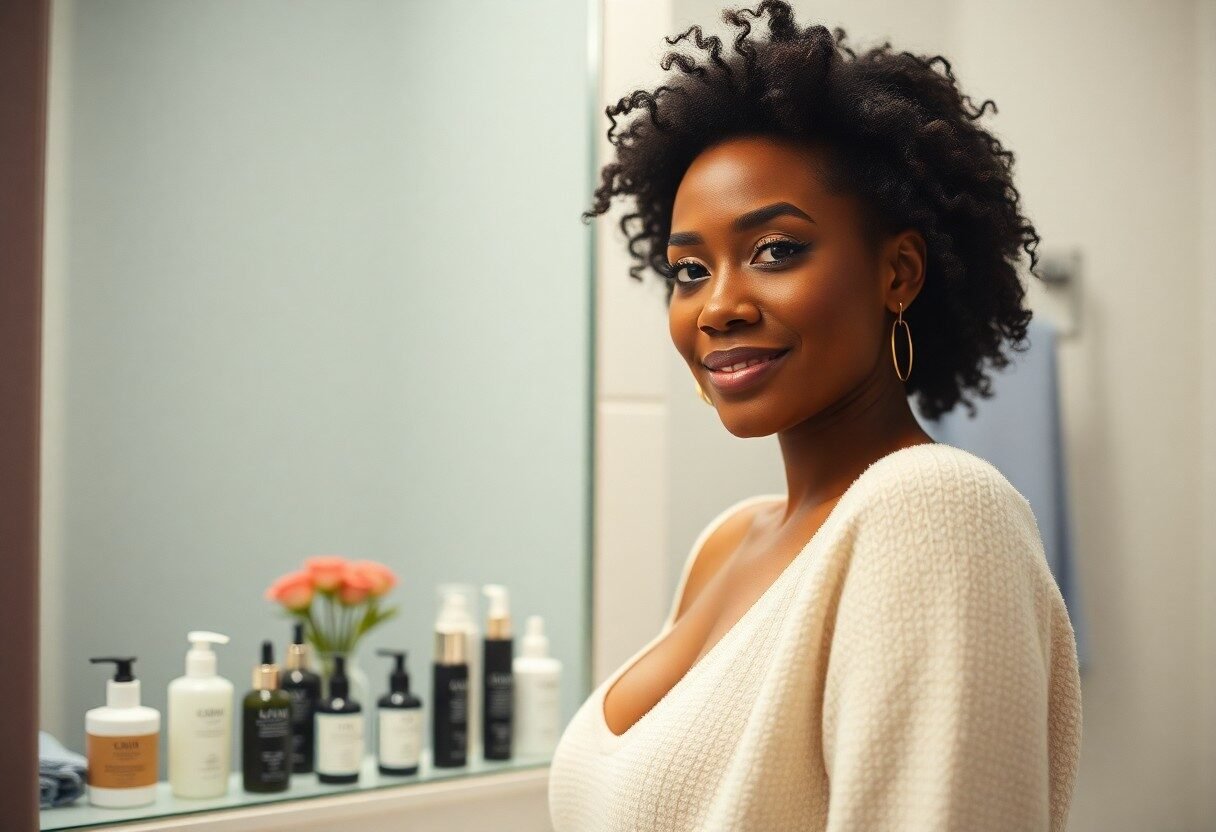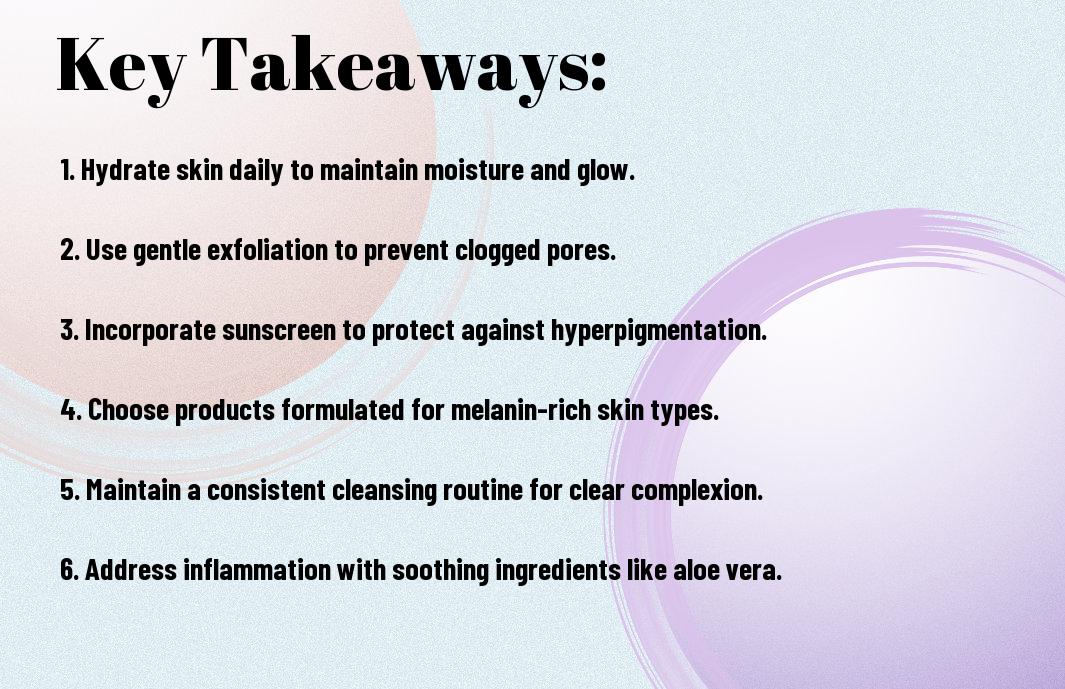
Just like many of you, I have journeyed through the challenges of achieving flawless skin. It’s not just about beauty; it’s about embracing your unique skin tone and understanding the specific concerns we face as African American women. Here, I’ll share effective tips and recommendations to help you combat issues such as hyperpigmentation, dryness, and acne. With the right knowledge and tools, you’re poised to achieve the radiant skin you deserve.
Key Takeaways:
- Understand your skin type: Identifying whether your skin is oily, dry, or combination is important for selecting the right products and routines.
- Emphasize hydration: Use moisturizers that contain ingredients like hyaluronic acid or shea butter to keep skin nourished and prevent dryness.
- Incorporate sun protection: Daily application of a broad-spectrum sunscreen is vital to protect against UV damage and hyperpigmentation.
- Focus on consistent cleansing: Use gentle cleansers that won’t strip natural oils from the skin, and cleanse twice a day for optimal results.
- Explore targeted treatments: Incorporate serums or treatments with ingredients like vitamin C, retinoids, or niacinamide to address specific skin concerns.
- Maintain a healthy diet: Include a variety of fruits, vegetables, and healthy fats to nourish the skin from within and promote a radiant complexion.
- Seek professional advice: Consulting with a dermatologist can provide tailored recommendations and effective solutions based on individual skin concerns.

Embracing Natural Beauty: Celebrating Skin Diversity
The Unique Characteristics of African American Skin
African American skin is distinctively beautiful and possesses unique characteristics that influence its care. The melanin content in your skin not only provides a rich tone but also offers a natural sun protection factor (SPF) against UV rays, reducing the risk of sunburn. However, this same melanin can contribute to hyperpigmentation, so understanding how to care for your skin’s specific needs is vital to achieving a flawless complexion.
Challenging Common Misconceptions
Several misconceptions surround African American skin that need addressing. Many believe that darker skin is less susceptible to skin issues, yet this is misleading. For example, conditions like acne and eczema can affect all skin types, irrespective of melanin levels. It’s important to debunk these myths to empower yourself to seek appropriate skincare treatments tailored to your unique needs.
By identifying and challenging these prevalent misconceptions, I discovered that misconceptions can often lead to a lack of proper care. For instance, the belief that darker skin doesn’t show signs of aging as quickly as lighter skin can result in neglecting important anti-aging products. Furthermore, many also assume that sunscreen is unnecessary for darker skin, ignoring the reality that all skin types require sun protection to prevent long-term damage. Ignoring these needs can hinder your journey to achieving glowing skin, underscoring the importance of personalized skincare regimens.
Decoding Skin Concerns: Specific Issues for African American Women
Hyperpigmentation and Dark Spots
Hyperpigmentation is a prevalent issue for many African American women, often manifesting as dark spots or patches on the skin. This condition occurs when the skin produces excess melanin, typically triggered by factors like sun exposure, hormonal changes, or post-inflammatory responses. Targeting these spots involves a combination of anti-aging creams, chemical peels, and professional treatments aimed at evening out skin tone. Natural remedies, such as licorice extract and vitamin C, can also help lighten these areas effectively.
Keloids and Scarring
Keloids and scarring pose unique challenges for African American women, often resulting from injury, acne, or surgical procedures. Keloids are raised scars that grow larger than the original wound, often caused by an overproduction of collagen during the healing process. Treatment options include silicone sheets, corticosteroid injections, and laser therapy, although results can vary significantly.
The formation of keloids is especially prevalent in African American skin, affecting anywhere from 10% to 16% of individuals. If you have a history of keloid formation, it’s wise to discuss potential preventive measures with your dermatologist prior to any surgical intervention or injury. Additionally, early treatment of any wounds and careful management of acne can minimize the risk of developing keloids or further scarring.
Oily Skin versus Dry Skin: Finding the Balance
Striking a balance between oily and dry skin can be challenging for African American women. Oily skin tends to produce excess sebum, leading to clogged pores and breakouts, while dry skin can result in flakiness and irritation. Identifying your skin type is imperative for selecting the right products. Lightweight moisturizers and gel-based formulas can help manage oil production, while hydrating creams for drier areas are needed to maintain moisture levels.
Understanding the factors that affect your skin’s oiliness or dryness can provide insights into managing your skincare routine. Stress, hormonal fluctuations, and environmental changes all play a role, so adapting your approach seasonally or according to your lifestyle can make a notable difference in achieving that radiant, balanced complexion. Regular exfoliation can also help with oil buildup, promoting a clearer and smoother surface.
The Power of Proper Skin Care: Tailored Routines and Products
The Importance of Cleansing and Exfoliating
Cleansing your skin effectively removes dirt, makeup, and impurities that can accumulate throughout the day. I find that choosing a gentle cleanser specifically formulated for African American skin helps maintain its natural moisture barrier while also addressing concerns like dryness and uneven texture. Exfoliating, on the other hand, sloughs off dead skin cells, allowing fresh, vibrant skin to appear. Incorporating exfoliation into your routine one to two times a week significantly enhances your skin’s overall glow and texture, leaving it looking radiant and refreshed.
Hydration Strategies: Oils, Creams, and Serums
Hydration is key to achieving that coveted flawless look. Opting for rich creams and nourishing oils targeted for dry, textured skin can make a world of difference. I often suggest integrating serums that focus on deep hydration, ensuring your skin remains supple and elastic throughout the day. By layering these products, you not only lock in moisture but also create a protective barrier against environmental stressors that can exacerbate dryness.
In my experience, oils, like jojoba or argan, provide a unique benefit due to their ability to mimic the natural oils your skin produces. This means they penetrate deeply, offering exceptional hydration. Creams rich in shea butter or glycerin can complement oils by forming an occlusive barrier to keep moisture locked in. Regarding serums, look for hyaluronic acid-infused options that attract moisture from the environment and draw it into your skin, leading to a plump and revitalized complexion.
Targeted Treatments: Ingredients that Work Magic
To effectively tackle specific skin concerns, incorporate targeted treatments with key active ingredients. I’ve found that products with vitamin C brighten and even out skin tone, while those containing niacinamide help reduce hyperpigmentation and improve texture. Retinol is another powerhouse when addressing fine lines and promoting cell turnover, but it’s vital to start slowly to allow your skin to adjust.
Many targeted treatments harness natural ingredients known for their healing properties. For instance, azelaic acid effectively calms inflammation and clears hyperpigmentation, making it ideal for skin prone to breakouts. Meanwhile, licorice root extract brightens and evens out the skin tone, providing a subtle glow. These ingredients not only serve to address specific issues but also enhance the overall health of your skin, ensuring you achieve that flawless look you desire.
Sun Protection: The Often Overlooked Essential
Understanding SPF: Myths and Realities
Many mistakenly believe that African American skin doesn’t need sun protection due to its natural melanin content. While melanin does provide some defense against UV rays, it does not render your skin immune to damage. I’ve found that using a sunscreen with an SPF of 30 or higher is necessary to prevent risks like skin cancer and accelerated aging. Basing your sun protection solely on skin tone can lead to serious misconceptions that ultimately compromise your skin health.
Choosing Sunscreens that Complement Darker Skin
Selecting the right sunscreen is imperative for maintaining your complexion while providing adequate protection. Look for formulations labeled as “non-greasy” or “matte finish,” which work well with darker skin to avoid the white cast that some products can leave. Products containing antioxidants and hydrating ingredients can enhance your skin’s appearance while offering protection. Always choose broad-spectrum sunscreens to combat both UVA and UVB rays effectively.
Moreover, opting for a tinted sunscreen can be a game-changer for darker skin tones. Tinted sunscreens not only offer protection but also provide some coverage for uneven skin tone and hyperpigmentation, giving you an additional cosmetic benefit. I personally enjoy products that blend seamlessly with my skin and prevent any ashy appearance. Look for finishes that are lightweight yet effective, ensuring your skin stays flawless throughout the day.

Nutrition and Its Impact on Skin Health
Superfoods for Radiance: What to Eat for Flawless Skin
Incorporating superfoods into your diet can significantly enhance your skin’s appearance. Foods rich in antioxidants, vitamins, and omega-3 fatty acids, like avocados, berries, and salmon, provide the nourishment your skin needs for a healthy glow. For example, avocados are high in healthy fats that promote skin elasticity, while berries help combat oxidative stress, leading to reduced signs of aging. Prioritizing these nutrient-dense foods can make your skin radiate with vitality.
The Role of Hydration: Drinking Enough Water
Keeping your skin hydrated is a key element in achieving that sought-after glow. Water directly affects your skin’s elasticity and texture, making it vital for maintaining a youthful appearance. Aim for at least 8-10 glasses of water daily to ensure your body and skin remain hydrated. Adding hydrating fruits, like cucumbers and watermelon, can further boost your hydration levels and contribute to your overall skin health.
Hydration also plays a significant role in flushing out toxins and keeping your skin moisturized from within. Dehydration can lead to dryness, flakiness, and even increased oil production, which may worsen skin issues. I’ve found that maintaining a consistent water intake helps prevent breakouts and dullness. You might even consider setting reminders on your phone or using a large water bottle to track your daily intake—small adjustments can lead to noticeable improvements in your skin’s texture and appearance.
Lifestyle Adjustments: Holistic Approaches to Skin Care
Stress Management Techniques for Healthier Skin
Managing stress is a fundamental aspect of maintaining radiant skin. High-stress levels can trigger acne flare-ups, eczema, and other skin conditions. Incorporating stress-relieving activities such as yoga, meditation, or simply spending time with loved ones can significantly enhance your skin’s appearance. By practicing deep-breathing exercises or engaging in hobbies that bring you joy, I’ve noticed a marked improvement in my complexion.
The Effects of Sleep: Beauty Sleep Revisited
Adequate sleep acts as your skin’s natural repair mechanism. During sleep, your body rejuvenates cells and releases growth hormones that promote renewal, resulting in a fresh and vibrant look come morning. Sleep deprivation can lead to dullness, increased dark circles, and other issues.
Regularly clocking 7 to 9 hours of quality sleep allows your skin to recover from daily wear and tear. I’ve personally experienced that my skin is plumper and more radiant when I prioritize sleep. Establishing a nightly routine—like dimming the lights and avoiding screens—can prepare your body for a deep slumber, further amplifying the benefits for your skin.
Exercise and Its Benefits for Skin Tone and Texture
Engaging in regular physical activity improves blood circulation, which carries oxygen and nutrients to the skin’s surface. This boost in circulation can help diminish the appearance of fine lines, enhance skin elasticity, and provide a glowing complexion. I personally feel the difference in my skin after a good workout session.
When you exercise, sweat helps flush out toxins, promoting clearer skin. Additionally, consistent exercise can reduce stress and improve sleep quality, reinforcing the multi-faceted benefits for your skin’s health. Activities like running, swimming, or even dancing elevate your heart rate, effectively transporting vital nutrients throughout your body to nourish every cell, including those in your skin. Adopting a consistent fitness routine can take your skin from lackluster to luminous.

Professional Treatments: When to Seek Specialized Help
Dermatological Procedures: Exploring Options
For those stubborn skin issues that won’t budge with home care, dermatological procedures offer various options tailored to individual needs. You might consider treatments like chemical peels, which exfoliate and improve skin texture, or microdermabrasion, which refreshes the skin’s surface. Additionally, laser therapy can target pigmentation problems and stimulate collagen production. Consultation with a dermatologist can guide you through a personalized plan that aligns with your skin type and concerns, ensuring you choose a procedure that complements your unique beauty.
Natural Therapies: Home Remedies that Benefit
Incorporating natural therapies into your skincare routine can be both soothing and effective. Ingredients like honey, turmeric, and aloe vera possess anti-inflammatory and moisturizing properties that can enhance your skin’s health. Simple remedies such as using a honey mask can hydrate while reducing inflammation, and making a turmeric paste can brighten your complexion. Even everyday items like oatmeal can serve as a gentle exfoliant. Tailoring these remedies to your personal preference creates an engaging way to nurture your skin naturally.
Utilizing natural therapies not only enhances your skincare routine but also brings a sense of connection to your roots. For instance, applying a green tea rinse can combat acne due to its high antioxidant content, while a homemade sugar scrub can enhance your skin’s glow by sloughing off dead cells. I’ve found that incorporating these simple solutions into my weekly regimen has made a noticeable difference. The beauty of these remedies is that they are gentle on the skin and allow you to control the ingredients, ensuring you’re treating your skin with care and love.
Building a Supportive Community: Sharing Knowledge and Experiences
Online Resources and Advocacy Groups
In today’s digital age, an array of online resources and advocacy groups exists to help African American women achieve effective skin care. Websites like the Black Dermatology Association and Skin of Color Society provide valuable insights tailored to our skin’s unique needs, offering everything from expert articles to community forums. By linking up with these platforms, you can access articles, videos, and discussions that highlight our specific concerns, ensuring you’re not alone in your journey towards flawless skin.
Empowering Each Other: Sharing Tips and Success Stories
The power of community should not be underestimated. It’s enriching to connect with others who share similar journeys, exchanging tips and celebrating triumphs. Whether through social media or local gatherings, sharing personal success stories fosters empowerment. Hearing about someone’s successful new routine or the right products they used can take your skin care regimen to the next level. Plus, it’s a reminder that you’re part of a larger narrative.
- Community support aids confidence and resilience.
- Sharing success stories can spark inspiration and motivate change.
- Exchanging tips promotes valuable knowledge, helping us navigate skin care together.
Any individual story holds the potential to resonate and inspire change for many. Finding your tribe can lead to increased confidence and foster an atmosphere where everyone feels free to share their experiences. Connecting in this way boosts our collective knowledge and encourages a sense of unity within our community. That’s the beauty of empowerment.
- Empowerment through connection can shift perspectives and improve outcomes.
- Shared experiences open doors to discovering new techniques.
- Community building can enhance your skin care journey.
Any story shared adds to a growing legacy of support that may transform not only individual skin care routines but also strengthen our community’s resilience. Through collaboration and shared knowledge, we all have the potential to thrive. Keeping the conversation going can help dismantle misconceptions and promote the importance of tailored skincare for our unique skin.
To wrap up
Now that I’ve shared my insights on achieving flawless skin as an African American woman, you can embrace a skincare routine tailored to your unique needs. By understanding your skin type, choosing the right products, and staying committed to a consistent regimen, you’ll see visible results. Hydration, sun protection, and nourishing ingredients are key to enhancing your natural beauty. Let’s celebrate our skin and enjoy the journey to radiance together!
FAQ
Q: What are the best skincare products for African American women?
A: When dicking out skincare products, look for those specifically formulated for your skin type. Ingredients like shea butter, cocoa butter, hyaluronic acid, and niacinamide are ideal. It’s also necessary to use products with antioxidants and SPF to protect against environmental damage and hyperpigmentation.
Q: How can I treat hyperpigmentation on darker skin tones?
A: Hyperpigmentation can be effectively treated using products containing vitamin C, kojic acid, or glycolic acid. Regular exfoliation, either chemically or physically, can also aid in reducing dark spots. Consulting with a dermatologist can help devise a personalized treatment plan.
Q: What are the key steps in a daily skincare routine for flawless skin?
A: A daily skincare routine should include cleansing, exfoliating, toning, and moisturizing, along with applying sunscreen in the morning. At night, consider adding a serum with active ingredients to target your specific skin concerns, such as fine lines or acne.
Q: How often should I exfoliate my skin for optimal results?
A: It’s recommended to exfoliate 1-3 times a week, depending on your skin type and the exfoliant used. If you have sensitive skin, stick to gentler methods and lower frequency. Always follow up with moisturizing to maintain hydration.
Q: What are some natural remedies for maintaining healthy skin?
A: Natural remedies such as using aloe vera gel, honey masks, or coconut oil can promote skin health. Additionally, maintaining a balanced diet rich in fruits, vegetables, and healthy fats contributes to overall skin vitality and hydration.
Q: How important is hydration for achieving flawless skin?
A: Hydration is vital for achieving healthy, radiant skin. Drinking ample water and using moisturizers suitable for your skin type ensures your skin remains supple and minimizes issues like dryness or flakiness. Hydrated skin also better retains its elasticity.
Q: Should I consult a dermatologist or esthetician for skin concerns?
A: Yes, consulting a dermatologist or licensed esthetician can be beneficial for addressing particular skin issues or concerns. They can provide tailored advice and treatment options that reflect the unique characteristics of African American skin.











